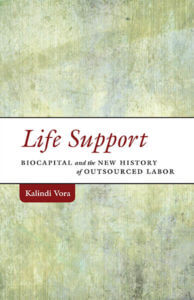Carson Prize 2018: Kalindi Vora

Life Support is a compelling multi-sited ethnography that analyzes call centers, IT outsourcing and gestational surrogacy in India as a kindred forms of outsourced vital labor. Over the course of the book, Vora draws these disparate cases together in surprising and productive ways, where each highlights less visible aspects of the other. The result is a work that brings new ethical and political insights to each case, as well as to broader discussions of biocapital and labor.
Analyzing and juxtaposing workers’ lives in call centers, IT outsourcing, and gestational surrogacy, Vora explicates how biocapitalism in these three cases extracts and simultaneously dismisses the value of outsourced laborers’ vital energy. For Vora, vital energy is the affective and emotional ability of humans to form relationships that help sustain one another. This vital energy is alienated through outsourcing labor, as a key quality of outsourced labor is its requirement of workers’ vital energy to soothe and insulate consumers/capitalists in the global north from the consequences of their own and others physical and emotional alienation. In call centers, for instance, employees’ work requires soothing concerned consumers from the global north not only through role-playing as if they are from the US, but also by living according to the rhythms and time zones of the global north. Inhabiting these roles, Vora argues, dislocates workers from their Indian social relations and locations.

Life Support stood out among the many great books as providing new frameworks for informing theoretical, engineering and advocacy work. Due in part to its expansive concepts, and in part to its method of generating those concepts through juxtaposing empirical situations in unanticipated ways, Life Support invites us to consider forms of emotional labor in situations beyond those discussed in its pages. It can prompt new questions about geopolitical gender formations in (bio)capitalist enterprises, about unspoken reproductive processes that establish who creates and who executes in STEM education, about affective work and affective costs in technoscience, and about new potentials for solidarity and political kinship that might emerge in tandem with technological and economic changes. For all its contributions, we are pleased and honored to recognize Kalindi Vora’s book, Life Support, with the 2018 Rachel Carson Prize.
2018 Carson Prize Committee: Sara Wylie (chair), Oscar Maldonado, Tim Choy
Acceptance Statement
I was astounded and honored when I received the news of the committee’s decision to award Life Support the Rachel Carson Prize. This book project drew upon ethnographic research in India over the course of several years, in worlds of information technology and of assisted reproduction. The project began while I was immersed in studying theories of how largely unseen labor produces the world, and I was struck by news of the growing incidence of people selling their kidneys in India as fewer and fewer opportunities to sell their labor could be found. The kidneys were being sold to brokers who transported them to places where more mobile Indian workers were striving to migrate: the Persian Gulf nations, Europe, and the US. This book project grew from the process of untangling the version of globalization that could explain this phenomenon, and the role of technology and colonial histories behind it and a spectrum of other transnational bodily and service work sectors in India. Life Support describes how critical race and postcolonial studies can be brought together with feminist science and technology studies to help explain India’s contemporary role as a site of service and support labor in the global economy. More specifically, the book is about the vastness of the work of reproducing social worlds and social beings, and how so many people in India invest their life’s work into producing social lives and social worlds that exist completely apart from their own. How can we understand this as a political problem, and how can we pay attention to what kind of changes are being demanded by people doing the work of life support? I am grateful first to collaborators and contacts in India who shared time and narratives with me. The support of my friends and family, as well as the conversation of colleagues and students at UC Santa Cruz, UC Berkeley, and UC San Diego. I also thank the committee for including Life Support as part of the legacy of politically and socially engaged scholarship marked by this award.
Bio
Kalindi Vora is Associate Professor of Gender, Sexuality and Women’s Studies at UC Davis, and Director of the Feminist Research Institute. She previously taught at UC San Diego Ethnic Studies and was affiliated with the Science Studies Program. She is co-author of Surrogate Humanity, a forthcoming book on the racial and gendered politics informing contemporary robotics and artificial intelligence design with Neda Atanasoski (Duke University Press, forthcoming). Her current research includes ongoing writing on legal and social justice concerns connected to assisted reproductive technologies in transnational commercial surrogacy, on autoimmunity and patient self-tracking and self-treatment, and on establishing models for feminist science shops at US Universities. She has a PhD in History of Consciousness from UC Santa Cruz (Feminist Studies) and an MA in Cultural Anthropology from the University of Hawai‘i Manoa, and a BA in Music/Religion from Wesleyan University. She also held the UC President’s Postdoctoral Fellowship at UC Berkeley Anthropology.
